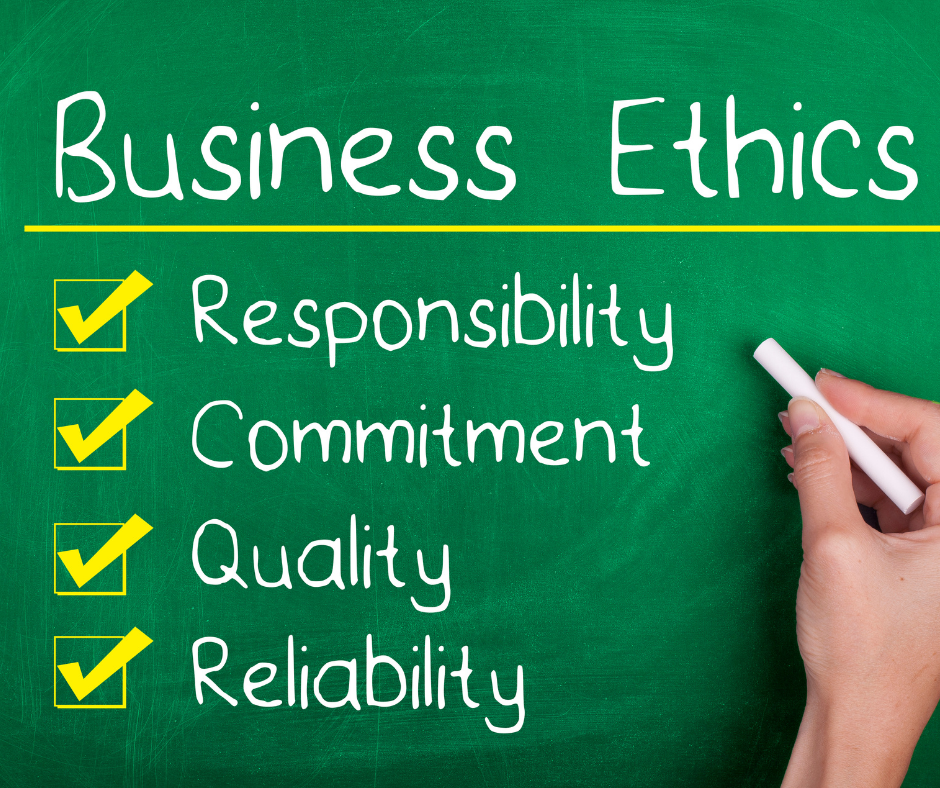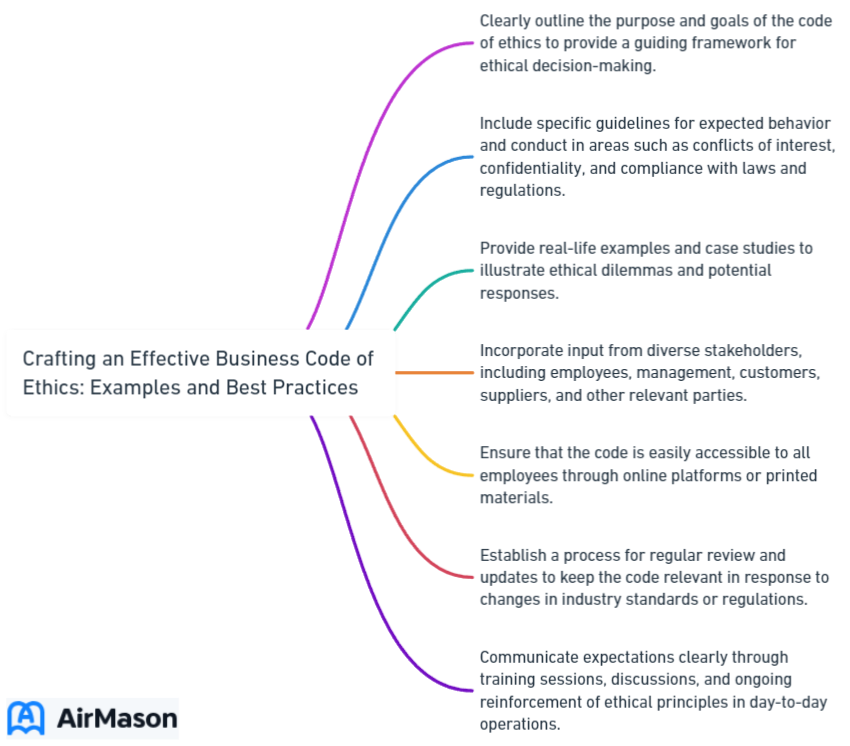
In today’s rapidly evolving and interconnected world, the importance of ethical behavior in business cannot be overstated. A strong code of ethics sets the foundation for trust, integrity, and success. Are you ready to learn more about crafting an effective business code of ethics and explore some business code of ethics examples? Let’s dive in!
Key Takeaways
- Business codes of ethics are essential for setting standards, building trust and reducing legal risks.
- They should include values & principles, behavioral standards, consequences for non-compliance and regular reviews.
- Effective implementation involves communication & training, reporting mechanisms, monitoring & rewarding ethical behavior.
Understanding the Importance of a Business Code of Ethics
A business code of ethics is a vital tool that outlines the principles of professional conduct and appropriate behavior in the workplace, based on the company’s core values. Implementing a code of ethics has numerous advantages, including:
- Establishing trust between the company and its customers
- Improving employee morale
- Reducing legal risks
- Promoting environmental responsibility
The significance of a business code of ethics lies in its role as a guide for conduct. It helps the company:
- Establish a clear standard of behavior
- Foster trust with customers and stakeholders
- Boost employee morale and retention
- Minimize legal risks
- Show leadership and social responsibility
- Advocate for sustainable practices
It’s no wonder that companies with a strong company’s code of ethics often enjoy increased success and a positive company’s reputation.

Business Code of Ethics
A business code of ethics is a fundamental set of principles and guidelines that outline the moral and behavioral expectations for individuals within a business organization. This code serves as a compass, guiding employees and stakeholders in making ethical decisions and conducting themselves in an honorable and responsible manner. It delineates the standards for integrity, honesty, transparency, and fair treatment in all business operations. Upholding a robust code of ethics fosters trust and credibility both internally among employees and externally with customers, suppliers, and the community at large. It reflects a company’s commitment to ethical conduct, reinforcing its reputation and demonstrating its dedication to social responsibility and sustainable business practices. Adhering to a well-defined business code of ethics is not only an ethical imperative but also a strategic business advantage in today’s interconnected and value-driven business landscape.
Key Components of an Effective Business Code of Ethics

An effective business code of ethics, also known as an organization’s ethical guidelines, must incorporate four main elements: values and principles, behavioral standards, consequences for non-adherence, and periodic review and updates.
Each component plays a vital role in establishing a robust and comprehensive ethical framework that guides employees in their decision-making process and promotes a culture of integrity and accountability.
Values and Principles
The values and principles that form the foundation of a business code of ethics should be based on the company’s mission and vision. These guiding principles serve as the moral compass for employees, ensuring that their actions align with the company’s core values. Some of the universal moral values that can be taken into consideration when constructing a code of ethics are:
- Trustworthiness
- Respect
- Responsibility
- Fairness
- Kindness
- Good citizenship
Stakeholder input is necessary when developing a code of ethics to guarantee that it truly mirrors the organization’s values. This collaborative approach fosters a sense of unity and commitment among employees, encouraging them to embrace the ethical guidelines and apply them in their daily work.
Standards of Behavior
Behavioral standards form a critical part of a business code of ethics, outlining clear expectations for employee conduct across different business aspects. These standards should be concise, easy to understand, and cover areas such as:
- Protection of company assets
- Avoidance of conflicts of interest
- Prevention of bribery
- Upholding of confidentiality
Beyond these general guidelines, it’s important to tackle industry-specific concerns like complying with applicable laws and safety regulations. Ensuring that employees understand and follow these standards fosters a culture of ethical behavior, promotes a healthy work environment, and minimizes the risk of legal issues.
Consequences for Non-Compliance
Clear consequences for non-adherence to the code of ethics are vital to uphold employee accountability and ensure compliance with the set guidelines. Consequences should be outlined in the code and may include disciplinary measures such as warnings, suspension, or termination.
By clearly communicating the repercussions of non-adherence, companies encourage employees to take the code of ethics seriously and make ethical decisions in their daily work. This approach fosters a culture of integrity, trust, and responsible behavior across the organization.
Regular Review and Updates
The code of ethics requires regular review and updates to maintain its relevance and stay aligned with the constantly changing business landscape and ethical standards. Changes in the following areas may necessitate revisions to the code:
- Legal, cultural, and geo-political contexts
- Current issues facing the industry
- Alterations in company policies and federal/state regulations
- Input from supervisors and employees
To effectively communicate modifications to the business code of ethics, companies should utilize training sessions, emails, and other forms of communication to keep employees informed and engaged. This proactive approach ensures that the code remains a living document that guides and supports the organization’s ethical journey.
Code Conduct Examples
Code conduct examples serve as valuable references for establishing and maintaining appropriate behavior within a particular community or organization. These examples embody the expected standards of conduct, ethics, and professionalism when engaging with the associated codebase, projects, or collaborative environments. Such guidelines may encompass respectful communication, adherence to coding standards, collaboration principles, and handling conflicts in a constructive manner. By showcasing tangible instances of acceptable behavior, code conduct examples provide a clear framework for fostering a positive and inclusive atmosphere within the coding community. They play a pivotal role in guiding developers toward responsible and harmonious interactions, ultimately contributing to a thriving and cohesive development ecosystem.
Industry-Specific Business Code of Ethics Examples

While the fundamental components of a business code of ethics are applicable to numerous industries, it’s important to customize the code to cater to the unique challenges and ethical issues of each specific industry.
Let’s look at some industry-specific examples of business codes of ethics for the healthcare, technology, and financial services sectors.
Healthcare Industry
In the healthcare industry, a code of ethics should prioritize patient safety, confidentiality, and ethical decision-making. Core values such as autonomy, beneficence, nonmaleficence, and justice, along with compassion, respect for human dignity and rights, trust, and equity, form the foundation of a healthcare code of ethics.
One of the critical aspects of a healthcare industry code of ethics is addressing confidentiality and privacy. Healthcare professionals must obtain patient consent before disclosing any personal health information, except in rare circumstances. Furthermore, adherence to state and federal laws like the HIPAA Privacy Rule is essential to ensure the privacy and security of patients’ health information.
Technology Industry
For the technology industry, a code of ethics should focus on data privacy, security, responsible innovation, and intellectual property. The rapid advancement of technology brings unique ethical challenges, such as the misuse of personal information, AI bias, and IoT data privacy. A robust code of ethics in this industry helps address these concerns and guides professionals in making ethical decisions.
Examples of technology industry codes of ethics include:
- The Association for Computing Machinery (ACM) Code of Ethics and Professional Conduct
- The Institute of Electrical and Electronics Engineers (IEEE) Code of Ethics
- The International Association of Software Architects (IASA) Code of Ethics
These codes provide frameworks for technology professionals to navigate the complex ethical landscape of their industry.
Financial Services Industry
In the financial services industry, a code of ethics should emphasize transparency, compliance with regulations, and fiduciary responsibility. Financial professionals have a duty to act in the best interests of their clients, and a strong code of ethics ensures that they comply with relevant laws, rules, and regulations.
Examples of financial services industry codes of ethics include:
- The Code of Ethics for Financial Professionals by the Financial Industry Regulatory Authority (FINRA)
- The Code of Ethics by the Investment Industry Regulatory Organization of Canada (IIROC)
- The Code of Ethics by the Chartered Financial Analyst Institute (CFA Institute)
These codes set the standards of conduct for financial professionals, ensuring that they act with integrity and serve the legitimate interests of their clients, while demonstrating professional competence.
Implementing and Enforcing Your Business Code of Ethics

Having examined the key elements and industry-specific instances of business codes of ethics, we’ll now delve into the important steps involved in introducing and enforcing a code of ethics within your organization.
Concentrating on communication and training, setting up reporting mechanisms, and observing and rewarding ethical conduct, you can nurture a culture of integrity and accountability that will advantage your business and its stakeholders while promoting sustainable practices.
Communication and Training

Effective communication is essential to ensuring that your code of ethics is understood and followed by all employees, customers, and stakeholders. Here are some crucial steps in communicating the code of ethics:
- Provide a copy of the code to each employee.
- Conduct training to ensure understanding of its contents.
- Make the code available on the company website and other relevant materials.
By following these steps, you can effectively communicate your code of ethics to all stakeholders.
Annual training sessions on the business code of ethics are necessary to keep the employees well-informed and involved. This helps reinforce the importance of ethical behavior and provides employees with the tools they need to navigate complex ethical situations in their day-to-day work.
Reporting Mechanisms

Establishing clear reporting mechanisms is crucial for ensuring compliance with your business code of ethics. Anonymous hotlines or online reporting systems can provide employees with a safe and confidential way to report suspected breaches of the code without fear of retaliation.
Offering employees multiple channels for reporting ethical concerns encourages them to come forward if they witness unethical behavior. It’s essential to have a zero-tolerance policy for retaliation against whistleblowers, ensuring that employees feel protected and supported when they report potential breaches of the code.
Monitoring and Rewarding Ethical Behavior
For the ongoing success of your business code of ethics, monitoring and rewarding ethical behavior is vital. Some ways to do this include:
- Addressing ethical issues promptly
- Leading by example
- Demonstrating your commitment to ethical standards
- Fostering a culture of integrity and accountability
Recognizing and rewarding employees for upholding the code of ethics not only motivates them to continue acting ethically but also encourages others to follow suit. By creating an environment where ethical behavior is valued and rewarded, you can cultivate a strong ethical culture that benefits your organization and its stakeholders.
Business Ethics Example
A notable business ethics example is the case of Enron, a once-prominent energy company that collapsed in the early 2000s. Enron engaged in deceptive accounting practices to portray a much healthier financial image than reality, leading to significant losses for investors and employees. This scandal highlighted the crucial importance of transparent and ethical financial reporting within organizations. Additionally, it underscored the need for stringent regulations and oversight to prevent such unethical conduct. The Enron case serves as a powerful reminder for businesses and regulators to prioritize ethical behavior and adhere to established industry standards to maintain trust and integrity within the business world.
Case Studies: Companies with Exemplary Business Codes of Ethics
There are numerous companies with exemplary business codes of ethics that serve as shining examples for other organizations to follow. These Fortune 500 companies, such as:
- Amazon
- Apple
- Dell
- Microsoft
They have been distinguished for their excellence in both their products and services, as well as their dedication to business ethics and corporate responsibility in their business dealings.
Examining these companies’ case studies can provide valuable insights into best practices and lessons learned. Their commitment to ethical principles and ethical business practices demonstrates how a strong code of ethics can contribute to a company’s success and positive reputation in the business environment.
Summary
In conclusion, crafting an effective business code of ethics involves understanding its importance, incorporating key components, adapting to industry-specific requirements, and implementing and enforcing the code through communication, training, reporting mechanisms, and monitoring and rewarding ethical behavior. By learning from companies with exemplary codes of ethics, we can create a strong ethical foundation for our own organizations, leading to increased trust, integrity, and success. Remember, “a business that makes nothing but money is a poor business.” – Henry Ford.
Frequently Asked Questions
What is an example of a business code of ethics?
A business code of ethics is a document outlining principles that guide decision-making. For example, an organization may commit to protecting the environment and “being green”, and the code of ethics will state that employees should choose the most environmentally-friendly solutions when faced with a problem. Additionally, the code of ethics may cover how its employees should behave and interact with clients, as well as the types of individuals it does business with.
What are the five codes of ethics in business?
The five codes of ethics in business are Fundamental Principles, Independence and Conceptual Framework, Integrity, Objectivity, Professional Competence and Due Care, Confidentiality and Professional Behaviour.
What are the benefits of implementing a business code of ethics?
Implementing a business code of ethics helps to build trust with customers, improve employee morale, reduce legal risks, and promote environmental responsibility.
How often should a business code of ethics be reviewed and updated?
Business code of ethics should be reviewed and updated on an annual basis to ensure its relevance and compliance with the changing ethical standards.
What are some examples of industry-specific business codes of ethics?
Examples of industry-specific business codes of ethics include the healthcare industry’s emphasis on patient safety, confidentiality, and ethical decision-making, the technology industry’s focus on data privacy, security, and responsible innovation, and the financial services industry’s commitment to transparency, compliance with regulations, and fiduciary responsibility.